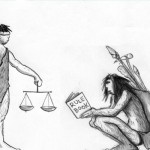Editor’s Note: In an effort to center New Economic Thinking in the discussion of the COVID-19 crisis, we’ve curated a list of Evonomics articles relevant to this moment—including this one. Check out the full list here.
29 June 2016
By Jag Bhalla
Paleo-economics shaped our moralities. Like our languages, our moralities are evolved social-coordination “technologies.”
1. By ~ 10,000 generations ago, our survival became a team sport. Driving big game toward teammates yielded more meat than solo hunting. But division of labor requires sustainable division of profits. Nowadays, we call that economics.
2. Christopher Boehm’s modern hunter-gatherer database shows they practice remarkably similar economics. His analysis concludes our ancestors evolved from hierarchy toward more egalitarian resource usage. Teams survive by changing the logic of self-maximizing.
3. Modern hunter-gatherers are ever vigilant against free-riding and elite-exploitation (both as dangerous to team survival as any predator). They rigidly enforce social rules to ensure skilled cooperators fare better than self-maximizers. For example: Another stakeholder distributes meat, not whoever made the kill. Rule-enforcement techniques = ridicule, shaming, shunning, and, ultimately, exile or execution.
4. Enforced rules create powerful environmental selection pressures. The lowest-cost strategy to avoid social penalties becomes preemptive self-control. Such impulse control has always been adaptive, even for powerful humans, because “counter-dominant coalitions” can punish “resented alpha-male” domination (like hogging an unfair share of meat). In extremis, this becomes “inverted eugenics,” eliminating the strong, if they abuse their power (e.g., survival by being ruthlessly cooperative).
5. This self-control payoff shaped our “moral sense,” which internalizes our culture’s behavioral rules and ensures we feel strongly that certain behaviours are right or wrong. Shame and guilt (e.g., evolutionarily useful “fast thinking”), enable “self-policed” social contracts (backed-up by social enforcement).
6. Our prior “apelike … fear-based social order” transitioned to include “internalizing rules and worrying about … reputations.” And conscious, reputation-based social selection for cooperation became dominant. E.g., known poor cooperators weren’t selected for the massively expensive raising of new humans. Team players preferentially bred with each other = we bred ourselves for cooperation.
7. However plausible (or otherwise) Boehm’s “Moral Origins” theory seems, key aspects are hard to deny. Humans empirically have culturally configurable social-rule processors (“moral sense”) and varying moral predispositions.
8. Rules beat no rules, by enabling improved social productivity. Our social-rule processors work just like our language-rule processors (both evolved for social coordination). We automatically absorb the (often tacit) rules of our native cultures grammar and behavioral norms. And we detect grammar errors unconsciously just like we often detect behavioral rule violations.
9. An “impulse to follow rules … seems … innate” (emerging untutored). Toddlers know certain rules shouldn’t be broken; they’re “genuinely moral.” Moralities, like languages, likely share underlying common structures that cultures configure differently (perhaps Jonathan Haidt’s six components).
10. Once our social-rule processors arose, their cultural configurations also became subject to evolution’s “productivity selection.” We’re descended from those with the fitter traits, and tools, and rules (i.e., higher productivity moralities).
11. Collective self-preservation now needn’t mean being “devoutly egalitarian.” But delegating our interdependent futures to mindless“market forces,” and their dumb coordination, isn’t always wise.
Highly configurable ethics are in our nature (our economics = our ethics enacted). Any configuration that deemphasizes our inalienable interdependence makes us less fit (less relationally rational).
Published at Big Think
Donating = Changing Economics. And Changing the World.
Evonomics is free, it’s a labor of love, and it's an expense. We spend hundreds of hours and lots of dollars each month creating, curating, and promoting content that drives the next evolution of economics. If you're like us — if you think there’s a key leverage point here for making the world a better place — please consider donating. We’ll use your donation to deliver even more game-changing content, and to spread the word about that content to influential thinkers far and wide.
MONTHLY DONATION
$3 / month
$7 / month
$10 / month
$25 / month
You can also become a one-time patron with a single donation in any amount.
If you liked this article, you'll also like these other Evonomics articles...
BE INVOLVED
We welcome you to take part in the next evolution of economics. Sign up now to be kept in the loop!























